NCERT Solutions For Class 2 Chapter 15 - How Many Ponytails
How Many Ponytails deals with the concept of data handling. This chapter have exercises on collecting and representing simple data, using pictographs. The solutions for Math-Magic Chapter-15 have been created and verified by our experienced subject matter experts, according to the CBSE syllabus and guidelines of NCERT. For practice, our subject matter experts have created very interactive, activity-based, and Image-based worksheets on these topics to enhance learning.
Download PDF For NCERT Solutions for Maths How Many Ponytails?
The NCERT Solutions For Class 2 Chapter 15 - How Many Ponytails are tailored to help the students master the concepts that are key to success in their classrooms. The solutions given in the PDF are developed by experts and correlate with the CBSE syllabus of 2023-2024. These solutions provide thorough explanations with a step-by-step approach to solving problems. Students can easily get a hold of the subject and learn the basics with a deeper understanding. Additionally, they can practice better, be confident, and perform well in their examinations with the support of this PDF.
Download PDF
Access Answers to NCERT Solutions For Class 2 Chapter 15 - How Many Ponytails
Students can access the NCERT Solutions For Class 2 Chapter 15 - How Many Ponytails. Curated by experts according to the CBSE syllabus for 2023–2024, these step-by-step solutions make Maths much easier to understand and learn for the students. These solutions can be used in practice by students to attain skills in solving problems, reinforce important learning objectives, and be well-prepared for tests.
How many Ponytails
Ask your friends to write their names on a paper.
Do it by yourself as directed. Answers may vary. Note down the names of your friends on a paper.
Find out:
a) The number of names ending with the same letter. _____
Do it by yourself as directed. Answers may vary. Observe the ending letter of each name and count the numbers of names that end with the same letter. For example, Ram, Akram, and Sam, these names are ending with the letter ‘M’.
b) One letter with which no name starts. _______
Do it by yourself as directed. Answers may vary. Observe the starting letter of each name and check the letter with which no name starts.
The number of names starting with the same letter. ______
Do it by yourself. Answers may vary. Observe the starting letter of each name and count the numbers of names that start with the same letter. For example, Ram, Rita, Rohan, and Riya all these names start with the letter ‘R’.
The fruit seller has some fruits for you. Look at them and find out what the different fruits are.
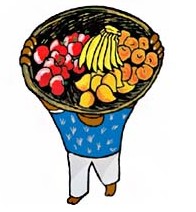
Observe the given picture. The fruit seller has four different kinds of fruits.
Apples, mangoes, bananas, and oranges.
Count and write.
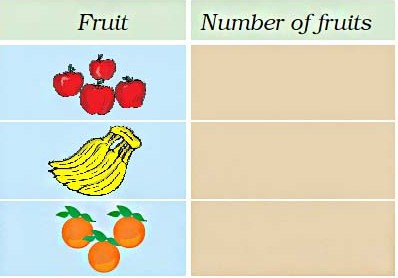
Observe the given picture and count the number of fruits. There are 4 apples, 5 bananas, and 3 oranges. Therefore, the correct answer is:
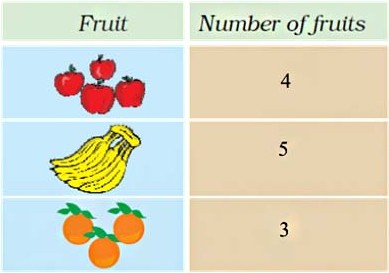
I like guavas! What do you like?
Do it by yourself. Write the name of your favourite fruit. Answers may vary.
Look at the children in your class. All children comb their hair in different ways. Look and write down.
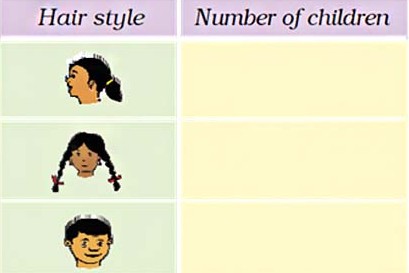
Do it by yourself. Answers may vary. Observe the hairstyle of each child in your class. Check the number of ponytails they have. Count the number of children having 1 ponytail, 2 ponytails, and no ponytail. Write down the information in the given table.
Find out and fill in the blanks.
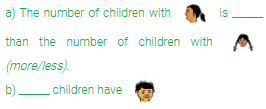
Do it by yourself. Answers will vary based on the table in the previous answer. Observe the table carefully, and check if the number of children with 1 ponytail is more or less than the number of children with 2 ponytails.
Look at the sole of the shoes or
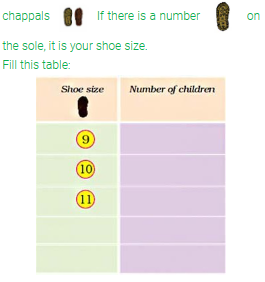
Do it by yourself. Answers may vary. Note down the shoe size of all the children in your class and fill in the table.
Find out

Do it by yourself. Answers may vary based on the table in the previous answer. Count the number of children having shoe size 9.
b) The number of children with

Do it by yourself. The smallest bottle will hold the least amount of water.
c) The largest number of children

Do it by yourself. Answers may vary. Observe the row with the largest number of children, the corresponding shoe size will be the correct answer.
d) The smallest number of children

Do it by yourself. Answers may vary. Observe the row with the smallest number of children, the corresponding shoe size will be the correct answer.
Ask your friends how many glasses of water they drink in a day and write below.
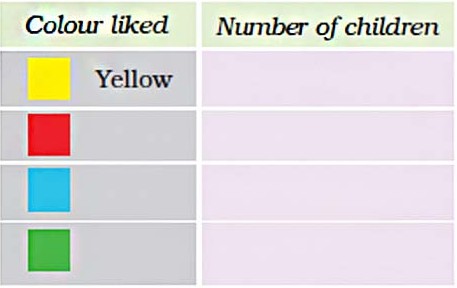
Do it by yourself as directed. Ask each friend how many glasses of water they drink in a day. Answers may vary based on the information provided by your friends. Count the number of friends who drink 1, 2, 3, 4, and 5 glasses of water to fill in the table.
Find out:

Do it by yourself. Observe the data in the table carefully and see the number of children who drink only 1 glass of water in a day.
Glasses of water are drunk by _____ children.
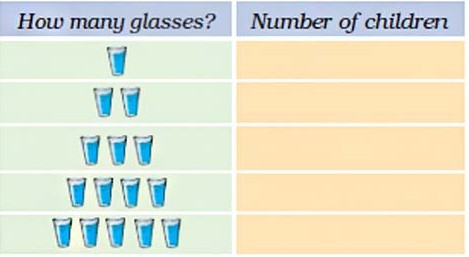
Do it by yourself. Observe the data in the table carefully and see the number of children who drink 5 glasses of water in a day.
c) The number of children who
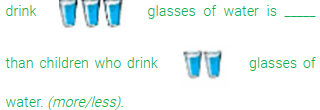
Do it by yourself. Answers may vary. Observe the data in the table carefully and check if the number of children who drink 3 glasses of water is more or less than the number of children who drink 2 glasses of water in a day.
Find out and colour the box.

Do it by yourself as directed. Answers may vary. Check the colour which corresponds to the largest number of children. Colour the box with that colour.

Do it by yourself. Answers may vary. Check the colour which corresponds to the largest number of children. The colour that corresponds to the largest number of children will be liked by more number of children than any other colour.

Do it by yourself. Answers may vary. Check the colour which corresponds to the smallest number of children. The colour that corresponds to the smallest number of children will be liked by less number of children than any other colour.
Ask your friends about the colour they like most. How many children like yellow? Write the number in the table. Fill the table for other colours.
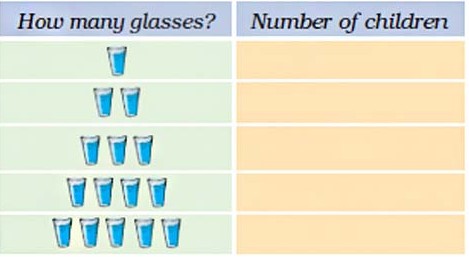
Do it by yourself as directed. Answers may vary. Ask each of your friends about their favourite colour. Note down the name of their favourite colour and then count the number of children who like the colours yellow, red, blue and green, and fill in the given table.
Admissions Open for 2025-26
Frequently Asked Questions
The NCERT solution for Class 2 Chapters 15 : How Many Ponytails? is important as it provides a structured approach to learning, ensuring that students develop a strong understanding of foundational concepts early in their academic journey. By mastering these basics, students can build confidence and readiness for tackling more difficult concepts in their further education.
Yes, the NCERT solution for Class 2 Chapters 15 : How Many Ponytails? is quite useful for students in preparing for their exams. The solutions are simple, clear, and concise allowing students to understand them better. Additionally, they can solve the practice questions and exercises that allow them to get exam-ready in no time.
You can get all the NCERT solutions for Class 2 Maths Chapter 15 from the official website of the Orchids International School. These solutions are tailored by subject matter experts and are very easy to understand.
Yes, students must practice all the questions provided in the NCERT solution for Class 2 Maths Chapters 15 : How Many Ponytails? as it will help them gain a comprehensive understanding of the concept, identify their weak areas, and strengthen their preparation.
Students can utilize the NCERT solution for Class 2 Maths chapter 15 effectively by practicing the solutions regularly. Solve the exercises and practice questions given in the solution. Also, you can make additional notes and jot down the important concepts for your understanding.

